牛津英语学案 Module 1 Unit 1 (第一单元)
牛津上海版(试用本)五年级上册英语Module 1 Unit 1 My birthday_教案

Unit 1 My birthday【教学目标】本单元重要的单词,短语和句子。
【教学重难点】本单元重要的单词,短语和句子的使用。
疑问句when’s…?和日期表达法。
When 用来询问某件事什么时候发生,通常问的是某一天。
它的回答是It’s on… 。
注意:what time也可用来询问时间,但它通常询问某一时刻。
【教学过程】一、核心词汇1.first第一2.second第二3.third第三4.fourth 第四5.fifth第五6.sixth第六7.party派对,聚会8.begin开始9.bring带来10.wear穿着11.favourite最喜欢的二、词组1.at Peter’s birthday party在Peter的生日聚会上2.on the 19th of September9月19日3.on Sunday在周日4.at two o’clock在两点5.in the afternoon在下午6.at night在晚上7.sb.be tired某人很累8.my favourite color我最喜欢的颜色9.That sounds interesting.那听上去有趣10.I can’t wait!我等不及了!11.Happy Birthday! 生日快乐12.Welcome to my party. 欢迎来我的派对13.a pair of orange trousers一条橙色的裤子14.make a birthday invitation制作一张生日请帖15.make a hat制作一顶帽子16.have some fun过得高兴17.birthday present生日礼物三、词汇解释1.bring,take,carry辨析bring是指把人或物从别处带到说话人所在的地方。
“由远及近”例如:Bring me some water, please.请给我取点水来。
take是指把人或物从说话人的地方带到别处去。
上海牛津英语一年级1A M2U1 教案
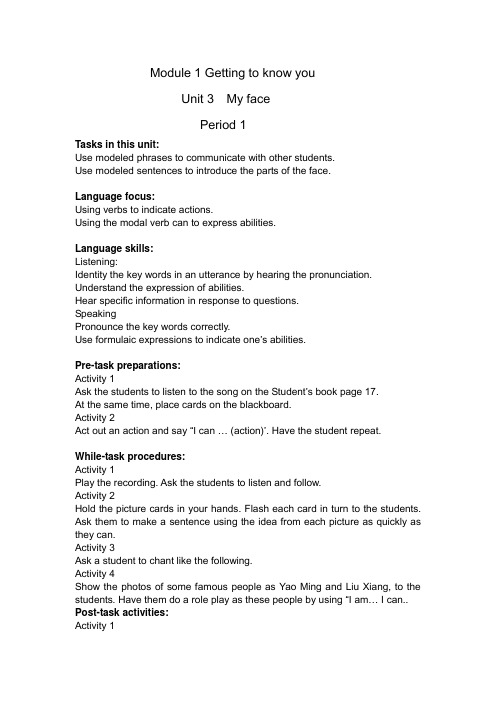
Module 1 Getting to know youUnit 3 My facePeriod 1Tasks in this unit:Use modeled phrases to communicate with other students.Use modeled sentences to introduce the parts of the face.Language focus:Using verbs to indicate actions.Using the modal verb can to express abilities.Language skills:Listening:Identity the key words in an utterance by hearing the pronunciation. Understand the expression of abilities.Hear specific information in response to questions.SpeakingPronounce the key words correctly.Use formulaic expressions to indicate one’s abilities.Pre-task preparations:Activity 1Ask the students to listen to the song on the Student’s book page 17.At the same time, place cards on the blackboard.Activity 2Act out an action and say “I can … (action)’. Have the student repeat.While-task procedures:Activity 1Play the recording. Ask the students to listen and follow.Activity 2Hold the picture cards in your hands. Flash each card in turn to the students. Ask them to make a sentence using the idea from each picture as quickly as they can.Activity 3Ask a student to chant like the following.Activity 4Show the photos of some famous people as Yao Ming and Liu Xiang, to the students. Have them do a role play as these people by using “I am… I can.. Post-task activities:Activity 1Have the students talk about their abilities.Activity 2Have the students do part A and part B on Workbook page 14. then check the answer.Period 2Language focus:Ask wh- questions to find out a person’s ability.Using verbs to indicate actions.Language skills:Listening:Hear specific information in response to questions.Speaking:Use modeled phrases to begin an interaction and maintain in by providing information in response to factual questions.Begin an interaction by eliciting a response.Pre-task preparations:Activity 1In turn, hold up the six pictures of actions at random. Ask the students to say and do the corresponding actions.Activity 2Select a student and ask “ what can you do?” prompt the students to answer with actions. Repeat the question for several times.While-task activity:Activity 1Ask the students to chant like the following. Divide the class into the groups. Have each group do substitutions and make new chant.Activity 2Ask the students to do part C on workbook page 15. then have the students repeat after the recording.Activity 3Have the students ask and answer in succession according to the picture. Activity 4Have the students play a memory game. Ask four students to come to the front of the classroom. Have one of them face the class and others face the blackboard. Then ask S1 to tell the students what S2,S3,and S4 can do.Post-task activities:Activity 1Practice “Do a survey”Activity 2Have students do Part D.Activity 3Have the students do Task。
四年级上册英语教案-Module1 Unit1 第一课时牛津上海版(深圳用)
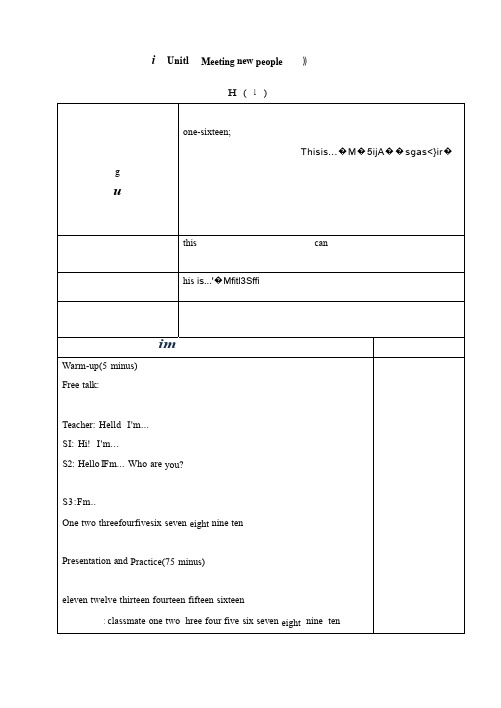
Presentation and Practice(75 minus)
eleven twelve thirteen fourteen fifteen sixteen : classmate one two hree four five six seven eight nine ten
i Unitl Meeting new people ))
H(1 )
one-sixteen;
g
u
Thisis...�M�5ijA��sgas<}ir�
this
can
his is...'�Mfitl3Sffi
im
Warm-up(5 minus) Free talk:
Teacher: Helld I'm... SI: Hi! I'm... S2: Hello IFm... Who are you?
2) This is... See you. #JALo - Nice to see you||.i��jALfllf�° - Nice to see you tooij2itl.i��jALfllf�°
Wif oPart 1: Look and say Good morning, Peter. Good morning, Kitty. This is my sister. Her name is Sally. Shes twelve.And his my brother. His name is Paul.'iimly six. Hi, Sally. Hi, Paul. My name is Kitty. I'm Peter
牛津上海版(三起)五年级英语上册Module 1 Unit 1 My future优秀教学设计

Oxford EnglishModule 1 Getting to know each otherUnit1 My future教学设计一、教学目标1.能在语境中正确运用本单元的核心词汇。
2.能用What do you want to be?询问对方将来想从事的职业,能用I want to be…表述自己想从事的职业并简单说明理由。
3.能读懂故事《小青蛙的新工作》,并能体会其中的道理。
4.能正确读出字母组合sk在单词中的发音,并能迁移到其他含有该字母组合的单词拼读中。
5.能根据自身情况树立符合实际的职业理想,做一个对社会有用的人。
二、教学内容1.语言知识:核心句型和日常用语:What do you want to be? I want to be a pilot.2.词汇:pilot, teach, cook, taxi driver,actor。
语言技能:3.听:听懂有关询问职业理想的小对话,了解彼此将来想从事的职业、及相关理由。
4.说:用I want to be ..,及I want to ... 介绍自己未来想从事的职业及理由。
用What do you want to be?询问对方将来想从事的职业。
5.读:读懂描写比尔盖茨和姚明的小短文。
6.写:正确书写本单元的核心词汇。
正确书写本单元的核心句型:What do you want to be?I want to be a pilot.三、教学重点词汇:want, pilot, teach, cook, taxi driver, actor。
句型:What do you want to be?I want to be ...四、教学难点want to do 与want to be 的正确用法。
五、教学准备多媒体设备,图片,阅读材料及句子贴纸。
六、教学过程(简)1.T:Today I want to take you to visit Madame Tussaud’s. Do you know Madame Tussaud’s? It’s very famous all over the world. You can see many famous people in it. But they are not real. They are justwaxwork(蜡像). Now let’s go!<Watch the video>2.T:Which famous people can you see it the video?T:Do you know Cheng Long? Now follow me, and you can learn more things about him. Here we go!(1)T: First, let’s read together!T: What is he? What does actor mean?(Read and write “actor”)T:Look! Who is he ? What is he ? (3 pictures) They are all actors. Actor is for man and actress is for woman.T: Who is your favourite actor? My favourite actor is Sun Honglei. How about you?T: What can an actor do?T: So an actor can make movies.(2)T: Look at the second paragraph. Who can read the first sentence? The second? (Find four Ss to read the sentences.)T: What is his grandpa? Let’s learn this word “taxi driver”.(Read and write )T: What can a taxi driver do?T: A taxi driver can drive a taxi.(3)T: What is his grandma ? Let’s learn this word “cook”.(4)T: Now watch this video. What is he? (He is a cook. Read and write .) T: Can you say? Good, food, book.T: A cook can cook...Yummy!T: So a cook can cook nice food.T: When I was young, liked eating and cooking. I can cook potatoes and eggs. I want to be a cook in the future. Because I want to cook nice food.(板书) Read together!(5)T: What is his father?Let’s learn this word “pilot”.(Read and write ) “Pilot” we can also say “airman”. They have the same meaning.T: What can a pilot do? A pilot can fly a plane.T: This is an amazing job. Do you want to be a pilot? ...What do you wantto be in the future? Why?(6)T: What is his mother?...3.Reading and learning.4.Fill in the blanks.5.Some more pictures about jobs.6.Different kinds of jobs.7.Listen and say.8.Talk about your future.9.Group work : famous people’s future.10.Read a short poetry.七、作业Please write down your future and tell it to your parents.八、板书My futureactor make moviestaxi driver driver a taxicook cook nice foodpilot fly a planeteacher teach children。
五年级上册英语教案Module1 Unit 1 (Period 4) 上海牛津版(试用版)
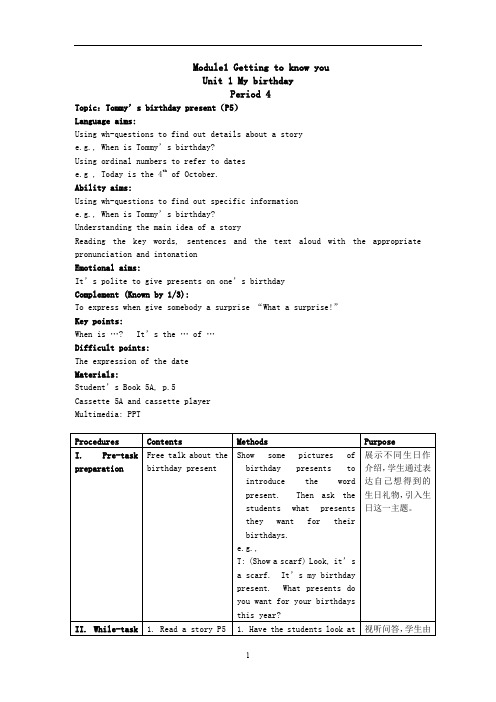
Understanding the main idea of a story
Reading the key words, sentences and the text aloud with the appropriate pronunciation and intonation
e.g.,
T: (point to picture1) What can you see in the picture?
S1: I can see a man, a boy and some hats.
T: (point to picture 2) Is the boy happy or sad?
S1: He’s sad.
Module1 Getting to know you
Unit 1 My birthday
Period 4
Topic:Tommy’s birthday present(P5)
Language aims:
Using wh-questions to find out details about a story
Contents
Methods
Purpose
I.Pre-task preparation
Free talk about the birthday present
Show some pictures of birthday presents to introduce the word present. Then ask the students what presents they want for their birthdays.
1. Stick the four pictures for the story on page 5 of Student’s Book at random on the blackboard. Have the students listen to the recording for the story. Then ask thestudentsto put the pictures in the correct order.
牛津沪教版英语四年级上Module 1 Unit 1教案(公开课用)
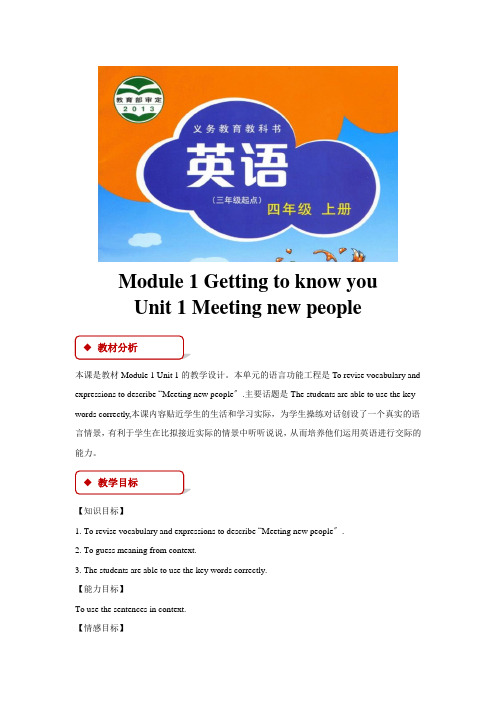
Module 1 Getting to know youUnit 1 Meeting new people本课是教材Module 1 Unit 1的教学设计。
本单元的语言功能工程是To revise vocabulary and expressions to describe “Meeting new people〞.主要话题是The students are able to use the key words correctly,本课内容贴近学生的生活和学习实际,为学生操练对话创设了一个真实的语言情景,有利于学生在比拟接近实际的情景中听听说说,从而培养他们运用英语进行交际的能力。
【知识目标】1. To revise vocabulary and expressions to describe “Meeting new people〞.2. To guess meaning from context.3. The students are able to use the key words correctly.【能力目标】To use the sentences in context.【情感目标】利用多种游戏或活动形式培养学生对英语学习的浓厚兴趣。
【教学重点】The students are able to use the key words correctly.【教学难点】通过阅读活动,引导学生通过阅读抓住关键信息,了解故事大意,通过角色扮演,让学生稳固和运用本单元所学核心词汇和句型。
Tape recorder, Multimedia.Step 1. Warm up1. Listen and sayT:What do you know about “Meeting new people 〞?Look at the pictures on P2 and PPT. Talk about “Meeting new people 〞.To introduce them to the topic.And encourage them to talk about the topic.2. ListeningPlay the listening materials,stop when necessary. And then check the answers.To train the students’ ability of catching the information of the listening materials.Step 2. Presentation1.Look and learnLead them to read and explain the “Meeting new people 〞.e.g:This is your new classmate,his name is...2. Make and say(1) Learn the rules in P3.(2) Finish the exercise on P3 and group work to work out the usage method of the “Meeting new people 〞.(3) Walk around to exam the situation and check the answers for them.(4) List the method of for them.(5) To develop their interests and lead them to the conclusion.Step 3. Practice1.Say and actLet the students look PPT and act the scene.To make them get familiar with the details of the text and train their ability of saying and reading.2. Sing a song(1) Let the students look PPT and sing a song.(2) Let the students get the general idea of the text.3. Learn the letters(1) Learn the letters in P5.(2) List the letters for them.(3) To develop their interest and lead them to the conclusion.Step 4.Homework1.Dictation.e the new words to make sentences on your own or check them in a dictionary.略。
2011牛津英语模块一
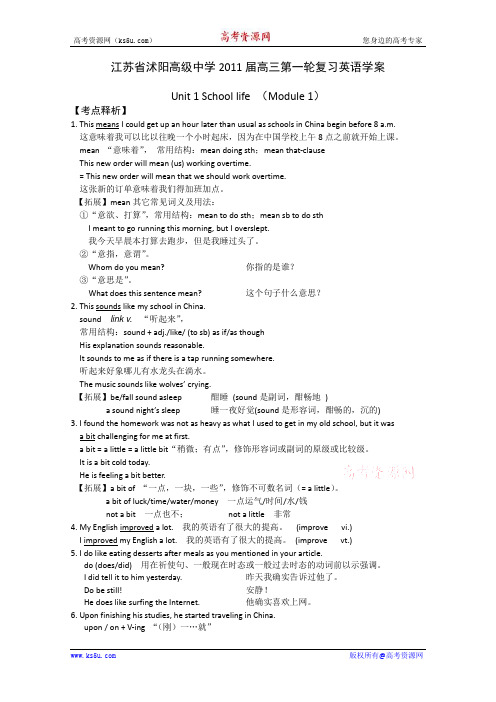
江苏省沭阳高级中学2011届高三第一轮复习英语学案Unit 1 School life (Module 1)【考点释析】1. This means I could get up an hour later than usual as schools in China begin before 8 a.m. 这意味着我可以比以往晚一个小时起床,因为在中国学校上午8点之前就开始上课。
mean“意味着”,常用结构:mean doing sth;mean that-clauseThis new order will mean (us) working overtime.= This new order will mean that we should work overtime.这张新的订单意味着我们得加班加点。
【拓展】mean其它常见词义及用法:①“意欲、打算”,常用结构:mean to do sth;mean sb to do sthI meant to go running this morning, but I overslept.我今天早晨本打算去跑步,但是我睡过头了。
②“意指,意谓”。
Whom do you mean? 你指的是谁?③“意思是”。
What does this sentence mean? 这个句子什么意思?2. This sounds like my school in China.sound link v. “听起来”,常用结构:sound + adj./like/ (to sb) as if/as thoughHis explanation sounds reasonable.It sounds to me as if there is a tap running somewhere.听起来好象哪儿有水龙头在淌水。
The music sounds like wolve s’ crying.【拓展】be/fall sound asleep 酣睡(sound是副词,酣畅地)a sound night’s sleep 睡一夜好觉(sound是形容词,酣畅的,沉的)3. I found the homework was not as heavy as what I used to get in my old school, but it wasa bit challenging for me at first.a bit = a little = a little bit“稍微;有点”,修饰形容词或副词的原级或比较级。
高中-英语-牛津译林版-英语Module 1 Unit 1(Welcome to the unit)

Teaching FeedbackModule 1 Unit 1 School lifeWelcome to the unitI. Teaching objectivesThe students are expected to be able to 1. meet the teacher and the classmates;2. compare school life in the UK and China;3. Share the dream school life .II. Teaching key points and difficulties1. differences and similarities between school life in China and the UK;2. design of the dream school life. III. Teaching method Task-based approach IV . Teaching aidsMulti-media , paperV . Teaching Procedures Step 1. Lead-in1. Self-introduction. Both the teacher and students introduce ourselves.Welcome to the unitUnit1School life•Class 1816•By Mrs. Xu【反思:】学生听得很认真,互相交流也很积极,达到了初步互相了解,解除陌生感的目的。
Step 2. Objectives1. Show the objectives of this period to the class.2. Read the objectives together.【反思:】目标清楚,而且这个时候已经完成了第一个目标,每个学生都知道这节课接下来要干什么。
- 1、下载文档前请自行甄别文档内容的完整性,平台不提供额外的编辑、内容补充、找答案等附加服务。
- 2、"仅部分预览"的文档,不可在线预览部分如存在完整性等问题,可反馈申请退款(可完整预览的文档不适用该条件!)。
- 3、如文档侵犯您的权益,请联系客服反馈,我们会尽快为您处理(人工客服工作时间:9:00-18:30)。
牛津英语学案系列材料2014年10月
Module 1 Unit 1 能力提升部分
一、选择适当的词填空,并根据需要使用适当的形式。
1. Do you ____________of doctors using human embryos for research?
2. The books were ___________ by a local publishing company.
3. Children need to ____________ things for themselves in order to learn from them.
4. Lawyers _____________ such high fees, but they never seem short of clients.
5. Coulthard's team were up all night _____________ the car for the race.
6. Mitch ___________ from Stanford in 1998 with a degree in biochemistry.
7. Please ______________ us of any change of address as soon as possible.
8. I __________ to learn German rather than French.
1. He is practising every day, in ______________ for the ice-skating championship.
2. Meeting Professor Kearney was a(n) ______________ which changed my life.
3. We had to write a _________________ about our summer vacations.
4. She was touched by this simple act of _____________.
5. Do you feel a sense of _________________ at the end of the working day?
6. Nkrumah led the people in their ______________ for independence.
1. I quite like living alone. It's made me more ______________.
2. She was _____________ in English, French, and German.
3. The laws were simplified so that the _____________ person could understand.
4. I try to make my lessons more _____________ by using games.
5. A ______________ report said that small amounts of alcohol are good for the health.
6. He had to choose between giving up his job and giving up his principles. He chose the _____.
1。
